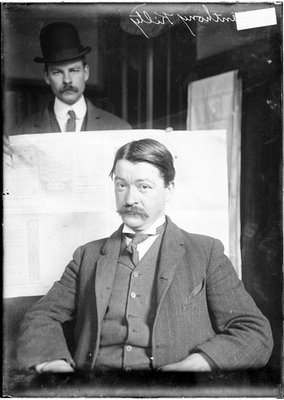
Meet Mr. Anthony Kilty, whom we see here in early November of 1907. His story, like so much of the past, exists today only in scattered fragments made up of crumbling paper, rotting celluloid, granulating wax cylinders, and the slow but sure self-destruction of nearly every medium science, technology and invention has brought forth.
These bits and pieces of our past, once so important and vital, are now artifacts that are either ignored, destroyed entirely, collected by some as one would collect stamps, or simply momentarily appreciated for having survived at all and then quickly forgotten once again.
Then, there are those like myself, who can't help but attempt to interpret them --- to place them into their proper historic prospective, and try to understand (although I never fully can) the world in which they either lived and breathed, or moved, or strived to entertain a public about to experience an onrush of technological development the likes of which hadn't occurred before or since.
At first glance, this dapper fellow seems moderately well dressed and neatly groomed in the style of his day, doesn't he?
But look again. Look at the small details.
A suit that while not shabby, could do with a pressing. A vest that doesn't quite match the weave and pattern of the jacket. The necktie that is somewhat askew. His hair, auburn I suppose, hasn't been combed as it would be for a portrait --- and his handsome moustache, also auburn, is decidedly uneven.
And behind him? The stern looking fellow in the derby hat is holding up a newspaper behind him so as to prevent details of his face and figure from blending into the dark wood interior of the room --- which, as it turns out, is a police station.
In fact, only moments before, Mr. Anthony Kilty had walked into an unspecified Evanston, Illinois police station and rather than report a crime, as I suppose anyone present might have expected, he announced that he wished to turn himself in... that he was a wanted criminal.
When pressed upon to tell his story, Kilty claimed it was all due to hard luck. He admitted that his first "job" took him to Northwestern University, where he attempted to steal clothing from a cloak room adjacent to a social frolic in progress. He inadvertently frightened a pair of co-eds who happened in upon him, and he fled... empty handed.
Ambitious, if nothing else, one evening during the first week of November, he gained entry to the home of one L.A. Eliel of Evanston, Illinois, a wealthy broker. Here, Kilty's apparent lack of stealth and skill would work against him once again, for he was soon discovered by Mr. Eliel himself, in the midst of gathering up whatever loot he could.
Oddly, Mr. Eliel, late middle-aged, distinguished and educated, did not sound an alarm, cry out or even seek to deter Anthony Kilty. As described in a contemporary newspaper account --- far removed from the source of the photograph --- let's hear Kilty tell his story as filtered through policemen, newspaper reporters and City Desk editors: "With a lump in his throat, and a suspicious moisture in his eyes, he described his visit to Eliel's house. He said that Eliel treated him so nicely (they had chatted and shared the broker's expensive cigarettes,) that when he (Eliel) asked him not to awaken the children for fear they would jump out of the window, he didn't have the heart to do it."
"Then," the newspaper account continues, "just as he was leaving with his loot, a tiny tot came running into the room and he just had to pause, stoop and kiss her. A few days ago, Kilty said he was walking on Clark Street, and spied the 'Welcome Men' sign on Dr. Terry's (an evangelist) big tent. He went inside, heard the sermon, and was all broke up by it. He then decided to make his peace with the law and his God, and give himself up."
And here, as if to punctuate the end of that newspaper article, is an image of Mr. Kilty and his kindly victim, Mr. Eliel... with a fatherly hand on Kilty's shoulder, offering a handshake of congratulation for having done the right thing.
At this point, the mists of time swirl thickly and swallow up both Mr. Kilty and Mr. Eliel, at least as far as I have been able to determine. It doesn't look as though Mr. Eliel would have pressed charges, although nothing was printed to indicate otherwise. Did Eliel offer Mr. Kilty an honest living after he paid his debt to society? Did Kilty serve time in prison and then discover, upon release, that Mr. Eliel had since passed away and with him a promise of redemption?
All that's left of Kilty, Eliel and a forgotten night of 1907 are these images, a perfunctory newspaper account and the knowledge that a gentle thief with auburn hair paused to kiss a little girl before stealing away into the clear, chilly night.
###
Glass photo negatives courtesy of the Chicago Daily News Negatives Collection, The Chicago Historical Society, DN-0005419, DN-0005418 & DN-0005416.

No comments:
Post a Comment